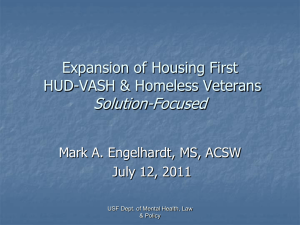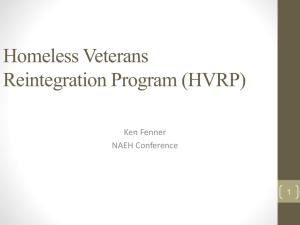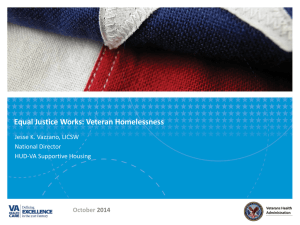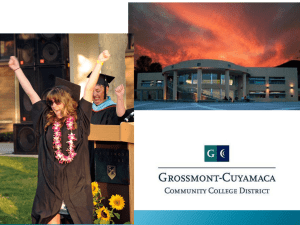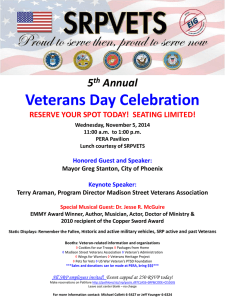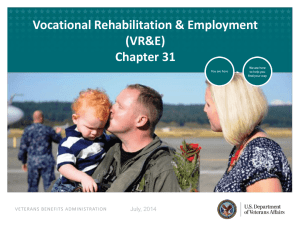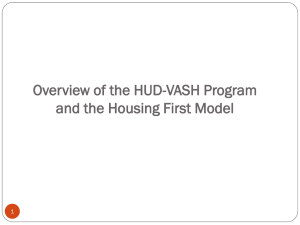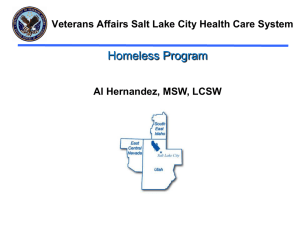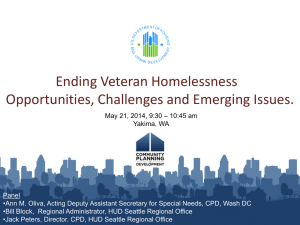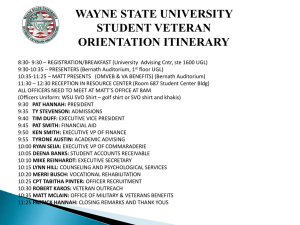here - University of Massachusetts Medical School
advertisement
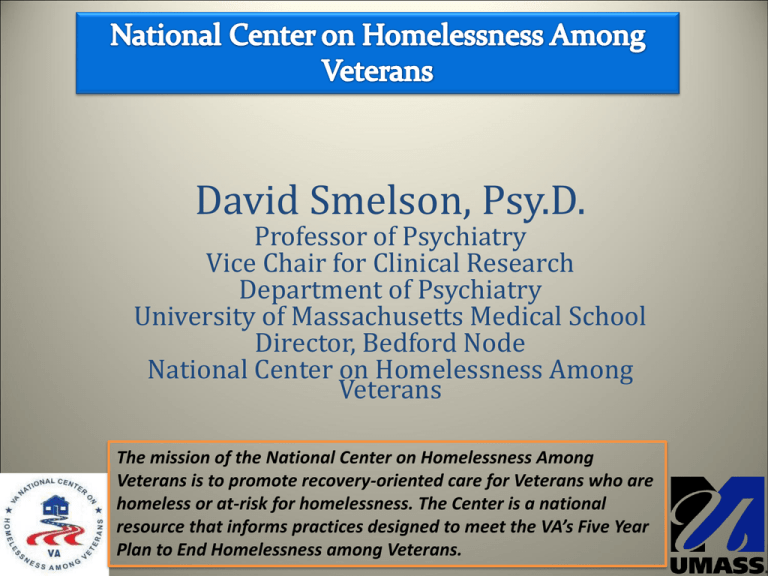
David Smelson, Psy.D. Professor of Psychiatry Vice Chair for Clinical Research Department of Psychiatry University of Massachusetts Medical School Director, Bedford Node National Center on Homelessness Among Veterans The mission of the National Center on Homelessness Among Veterans is to promote recovery-oriented care for Veterans who are homeless or at-risk for homelessness. The Center is a national resource that informs practices designed to meet the VA’s Five Year Plan to End Homelessness among Veterans. Background NCHV Established in 2009 response to President Obama’s call to: End Veteran homelessness by 2015 ZERO-tolerance policy on homeless Veterans 1/3rd of homeless population were Veterans “President Obama and I are personally committed to ending homelessness among Veterans. Those who have served this nation as a Veteran should never find themselves on the street, living without care and without hope.” – Secretary Shinseki VA Funded – 1.9 million annually across 3 nodes – 5 years of funding Goals – Track/Reduce Number of Homeless Veterans – Strategic Alignment • Research • Education • Clinical Care • Policy/Administration – Oversight of $801 Million Budget (Doubled 2009) Program Cores Bedford VA Philadelphia VA Policy Analysis Core Research and Methodology Core Tampa VA Model Development Core Education and Dissemination Core Bedford, MA Model Development and Implementation Core • Test Evidenced Based Practices • Adapt Practices for Veterans Model • Develop New Practices Development Core • Provide Technical Assistance Bedford VA/UMass Model Development Node David Smelson, PsyD (Director, NCHV Bedford Node) Gerardo Gonzalez, MD (NCHV Site PI/Director Division of Addiction Psychiatry) Marsha Langer Ellison, PhD (Investigator, Supported Employment/Supported Ed.) Lisa Najavits, PhD (Investigator, PTSD and Addictions) Stephanie Rodrigues, PhD (Investigator, Stigma) Matthew Chinman, Ph.D. (Investigator, Implementation Science) Gregg DiGirolamo, PhD (Cognitive Neuroscience) Lisa Fortuna, MD, MPH (Technology Development in TAY) Rich Fletcher, PhD (Technology Development) Leon Sawh, MPH (Site Project Director) Liz Aaker (Project Director) Julianne Siegfriedt, MA (Research Coordinator) Emily Munoz (Program Support) Kathryn O’Connor (Research Assistant, Technology Program) 1. Manual Development Projects • Goal: • Standardize Practices • Dissemination Practices • Manuals to Date 1. MISSION-VET Treatment Manual 2. MISSION-VET Consumer Workbook 3. Supported Education Manual 4. HUD-VASH Resource Guide https://umassmed.edu/psychiatry/VANationalCenteronHomelessnessAmongVeterans.asp 2. Co-Occurring Disorders Treatment Research Area 1. MISSION-Vet HUD-VASH Implementation Study (2011-2015) • 2. HUD-VASH SUD Randomized Controlled Trial (2010-2013) • 3. Test 3 Interventions (varying in intensity) to Augment HUD-VASH MISSION DIRECT VET Jail Diversion Program (2008-2013) • 4. Use Getting To Outcomes (GTO) to Implement MISSION in 3 VISN’s Divert Veterans and offer MISSION Services ATTOC in Homeless Residential Care • Adopt and Implement ATTOC Model for Smoking Cessation 3. Housing Placement and Retention 1. Safe Haven • Serves severely mentally ill Veterans with co-occurring disorder • Does not punish relapse 2. Housing First • Shift of focus to rapid placement of Veterans in housing and intensive wraparound services 3. HUD-VASH Exiter Study • Evaluation of HUD-VASH clients who leave program early 4. Peer Support/Supported Education Research Area Support Education Research: 1. Needs assessment for supported education among OIF/OEF Veterans 2. Pilot RCT of Supported Ed among OIF/OEF Veterans with PTSD 3. Pre-implementation Planning Supported Education Rollout in VA Peer Support Research: 1. Unbundling MISSION to Test Peer Support in HUD-VASH 2. Peers in Homeless Medical Home Primary Care Setting 5. Anti-Stigma Research Area • Self-Stigma and Treatment Engagement 1. Survey of self-stigma among co-occurring disorders and homelessness Veterans 2. Adopt “Coming Out Proud” for Veteran population Public Stigma 1. Public service announcement on homelessness Veterans 2. Pilot anti-stigma campaign for high school students 6. Mobile Technology Development Research Area • Use of mobile technologies to enhance treatment engagement among hardto-reach HUD-VASH clients via: Current Projects: 1. Needs assessment of technologies homeless Veterans can access 2. Test feasibility of text messaging to promote treatment 3. Real time Relapse Prevention via mobile device & connected sensor band •Massachusetts : 2011 Doubled Reduction in Homeless Veterans (23% Massachusetts Vs. 11% US) *Data collected jointly by VA and HUD Veteran Homelessness: A Supplemental Report to the 2009 & 2010 Annual Homeless Assessment Report to Congress (2009 & 2010 Veteran AHAR) OEF/OIF Homeless Vets (actual and at risk) FY2002 – FY2009 Incidence (new homeless cases) Questions?
